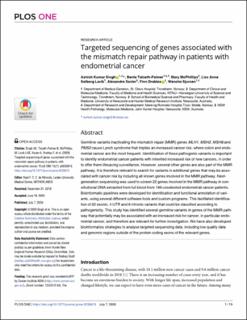| dc.contributor.author | Singh, Ashish Kumar | |
| dc.contributor.author | McPhillips, Mary | |
| dc.contributor.author | Talseth-Palmer, Bente | |
| dc.contributor.author | Lavik, Liss Ane | |
| dc.contributor.author | Xavier, Alexandre | |
| dc.contributor.author | Drabløs, Finn | |
| dc.contributor.author | Sjursen, Wenche | |
| dc.date.accessioned | 2020-08-20T07:28:43Z | |
| dc.date.available | 2020-08-20T07:28:43Z | |
| dc.date.created | 2020-08-19T15:38:34Z | |
| dc.date.issued | 2020 | |
| dc.identifier.citation | PLOS ONE. 2020, 15 (7), . | en_US |
| dc.identifier.issn | 1932-6203 | |
| dc.identifier.uri | https://hdl.handle.net/11250/2673083 | |
| dc.description.abstract | Germline variants inactivating the mismatch repair (MMR) genes MLH1, MSH2, MSH6 and PMS2 cause Lynch syndrome that implies an increased cancer risk, where colon and endometrial cancer are the most frequent. Identification of these pathogenic variants is important to identify endometrial cancer patients with inherited increased risk of new cancers, in order to offer them lifesaving surveillance. However, several other genes are also part of the MMR pathway. It is therefore relevant to search for variants in additional genes that may be associated with cancer risk by including all known genes involved in the MMR pathway. Next-generation sequencing was used to screen 22 genes involved in the MMR pathway in constitutional DNA extracted from full blood from 199 unselected endometrial cancer patients. Bioinformatic pipelines were developed for identification and functional annotation of variants, using several different software tools and custom programs. This facilitated identification of 22 exonic, 4 UTR and 9 intronic variants that could be classified according to pathogenicity. This study has identified several germline variants in genes of the MMR pathway that potentially may be associated with an increased risk for cancer, in particular endometrial cancer, and therefore are relevant for further investigation. We have also developed bioinformatics strategies to analyse targeted sequencing data, including low quality data and genomic regions outside of the protein coding exons of the relevant genes. | en_US |
| dc.language.iso | eng | en_US |
| dc.publisher | Public Library of Science (PLOS) | en_US |
| dc.rights | Navngivelse 4.0 Internasjonal | * |
| dc.rights.uri | http://creativecommons.org/licenses/by/4.0/deed.no | * |
| dc.title | Targeted sequencing of genes associated with the mismatch repair pathway in patients with endometrial cancer | en_US |
| dc.type | Peer reviewed | en_US |
| dc.type | Journal article | en_US |
| dc.description.version | publishedVersion | en_US |
| dc.source.pagenumber | 19 | en_US |
| dc.source.volume | 15 | en_US |
| dc.source.journal | PLOS ONE | en_US |
| dc.source.issue | 7 | en_US |
| dc.identifier.doi | https://doi.org/10.1371/journal.pone.0235613 | |
| dc.identifier.cristin | 1824122 | |
| dc.description.localcode | Copyright: © 2020 Singh et al. This is an open access article distributed under the terms of the Creative Commons Attribution License, which permits unrestricted use, distribution, and reproduction in any medium, provided the original author and source are credited. | en_US |
| cristin.ispublished | true | |
| cristin.fulltext | original | |
| cristin.qualitycode | 1 | |

